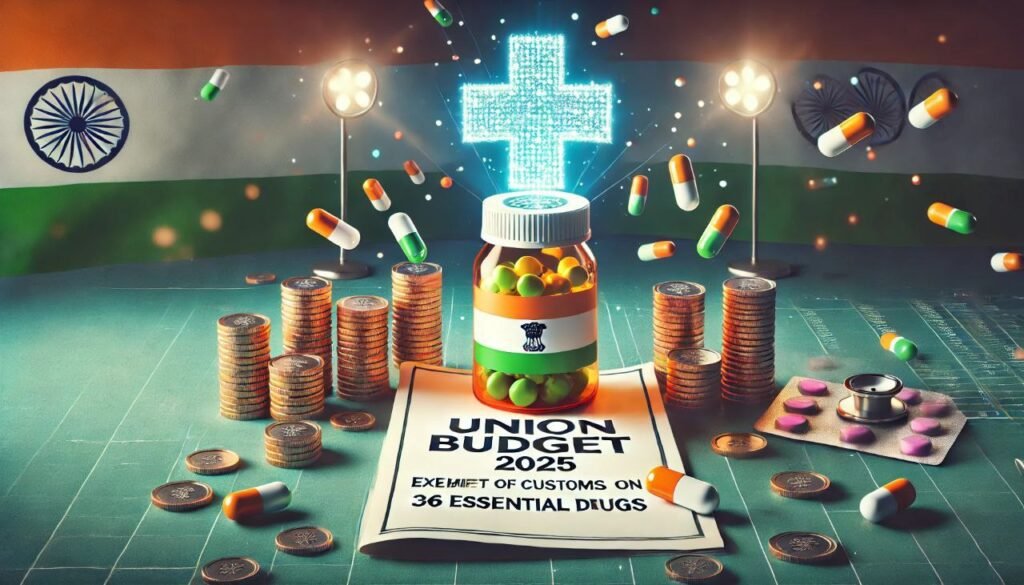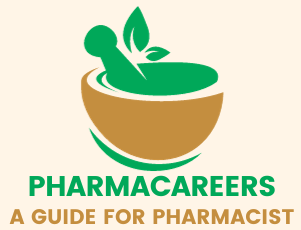Union Budget 2025: Exemption of Custom Duty on 36 Life-Saving Medicine
The Indian government has taken a significant step towards improving healthcare accessibility by exempting custom duty on 36 life-saving medicines in the Union Budget 2025. This move, announced by Finance Minister Nirmala Sitharaman, aims to make essential medications more affordable for patients suffering from severe diseases such as cancer, rare genetic disorders, and chronic conditions.

Background and Rationale
The decision to exempt custom duty on these medicines is part of the government’s broader strategy to enhance public health and ensure that vulnerable populations have access to critical treatments. The 36 drugs listed include treatments for conditions like spinal muscular atrophy, Gaucher’s disease, multiple myeloma, and various forms of lymphoma. By reducing the financial burden on patients, the government hopes to improve treatment outcomes and overall quality of life.
What is Custom Duty
Custom duty is a tax imposed by a country’s government on goods imported into or exported out of the country. It is used to regulate the movement of goods across borders, protect domestic industries, and generate revenue for the government. In essence, it makes imported goods more expensive, encouraging consumers to buy locally produced products. The rates and regulations for custom duties can vary depending on the type of goods and the trade agreements between countries.
Key Medications Exempted
Some of the key medications that will benefit from this exemption include Onasemnogene Abeparvovec (gene therapy for spinal muscular atrophy), Velaglucerase Alpha (for Gaucher’s disease), Daratumumab (for multiple myeloma), and Atezolizumab (for various cancers). These drugs are often expensive and difficult to afford for many patients, making the exemption a crucial step towards better healthcare access.
Here is the list of 36 life-saving medicines that has exempted from the custom duty:
1. Onasemnogene abeparvovec
2. Asciminib
3. Mepolizumab
4. Pegylated Liposomal Irinotecan
5. Daratumumab
6. Daratumumab subcutaneous
7. Teclistamab
8. Amivantamab
9. Alectinib
10. Risdiplam
11. Obinutuzumab
12. Polatuzumab vedotin
13. Entrectinib
14. Atezolizumab
15. Spesolimab
16. Velaglucerase Alpha
17. Agalsidase Alfa
18. Rurioctocog Alpha Pegol
19. Idursulphatase
20. Alglucosidase Alfa
21. Laronidase
22. Olipudase Alfa
23. Tepotinib
24. Avelumab
25. Emicizumab
26. Belumosudil
27. Miglustat
28. Velmanase Alfa
29. Alirocumab
30. Evolocumab
31. Cystamine Bitartrate
32. CI-Inhibitor injection
33. Inclisiran
34. Agalsidase Beta
35. Imiglucerase
36. Eptacog alfa activated recombinant coagulation factor VIIa
Impact on Patients and Healthcare System
The exemption is expected to lower treatment costs by 10-20%, depending on the drug. This reduction in cost will make it easier for patients to access these life-saving treatments, especially those relying on Patient Assistance Programs (PAPs) run by pharmaceutical companies3. The move is also anticipated to drive greater collaboration between pharmaceutical companies, healthcare providers, and government agencies to expand affordable treatment options in India.
Additional Measures in the Budget
In addition to the exemption on custom duty, the Union Budget 2025 includes several other measures aimed at improving healthcare infrastructure. The government plans to set up daycare cancer centers in district hospitals and add 10,000 additional seats in medical colleges over the next five years4. These initiatives are part of a broader effort to enhance medical education and provide better healthcare services to the population.
Conclusion
The exemption of custom duty on 36 life-saving medicines is a commendable step by the Indian government to make essential medications more affordable and accessible. This move will benefit patients suffering from severe diseases and contribute to the overall improvement of public health in the country. As the government continues to implement measures to enhance healthcare accessibility, it is hoped that more patients will receive the treatments they need to lead healthier lives.
For more regular updates you can visit our social media accounts,
Instagram: Follow us
Facebook: Follow us
WhatsApp: Join us
Telegram: Join us
